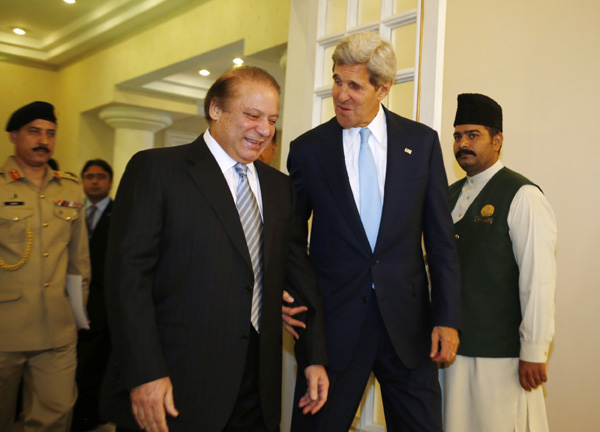US, Pakistan agree to start new chapter in long-strained relations
|
US Secretary of State John Kerry walks into a meeting with Pakistan's Prime Minister Nawaz Sharif in Islamabad on Thursday. Kerry said the two countries will resume high-level negotiations over security issues. Jason Reed / Reuters |
The United States and Pakistan agreed on Thursday to re-establish a "full partnership", hoping to end years of animosity over US drone strikes on Pakistani soil, the raid that killed Osama bin Laden and other grievances.
"We are here to speak honestly with each other, openly about any gaps that may exist that we want to try to bridge," US Secretary of State John Kerry said during an unannounced visit to Islamabad. "Our people deserve that we talk directly."
Both sides are now keen to overcome the grievances and start afresh, a shift in priorities they hope is possible with a new government in Pakistan and a new secretary of state in the US.
With Pakistan's economy badly in need of support and the US keen on smoothly withdrawing most of its troops from neighboring Afghanistan next year, both sides will see positives in repairing the relationship.
Speaking after talks with Pakistani Prime Minister Nawaz Sharif in Islamabad, Kerry - who as a senator sponsored legislation to provide $7 billion in assistance to Pakistan over five years - said the two countries were serious about overcoming past irritants.
He invited Sharif to visit the US - Pakistan's biggest donor - for talks with US President Barack Obama.
"America does not want to have a transactional relationship, we do not want to have a relationship based on one moment or based on issues such as counter-terrorism or Afghanistan," Kerry said.
"What was important today was that there was a determination ... to move this relationship to the full partnership that it ought to be, and to find the ways to deal with individual issues that have been irritants over the course of the past years."
He added: "And I believe that the prime minister is serious about doing that. And I know that President Obama is also."
Kerry, who arrived in Pakistan late on Wednesday, is the most senior US official to visit Islamabad after Sharif's election in May.
While this is Kerry's first visit to Islamabad as secretary of state, he has a long history of dealing with Pakistan as former chairman of the Senate Foreign Relations Committee. Sharif described him as "a wonderful friend", and Kerry said, "I have had the pleasure of visiting (Sharif's) home and having a number of meals with him."
Yet, continued US drone strikes against militants in Pakistan's northwest remain a big hurdle. The use of drones is a highly sensitive issue in Pakistan and anti-US feelings run deep in parts of the South Asian country.
Drone missiles have been hitting targets since 2004 in troubled areas on the Afghan border such as North Waziristan, the main stronghold for various militant groups aligned with al-Qaida and the Taliban.
Despite the tensions in ties, the US remained Pakistan's biggest donor, although there have been calls in Congress in the past to cut off aid.
The ties improved fractionally last year after the two sides reached a deal to reopen land routes used to supply Western troops in Afghanistan that were cut off after the air strike in November 2011 that killed Pakistani soldiers.
Mutual suspicions, however, remain. Washington wants Islamabad to do more to eradicate militant havens and crack down on groups such as the Haqqani network, which regularly attacks US forces in Afghanistan from hideouts in Pakistan.
Pakistan itself has seen a spate of attacks against its military and civilians by the Pakistani wing of the Taliban since Sharif was sworn in on the back of promises to talk to the insurgents rather than fight them.
Speaking alongside Kerry, Sartaj Aziz, Sharif's adviser on foreign affairs, appeared to harden that position, saying his government might resort to the use of military force after all against the Taliban.
"Obviously, dialogue has to go along with military action," he said, adding at the same time that Pakistan wanted the US to end the drone strikes.
"We will explore that (talk) option first and if that doesn't work, we will see under what conditions and by what time frame we do the alternative."
Reuters-AP



















